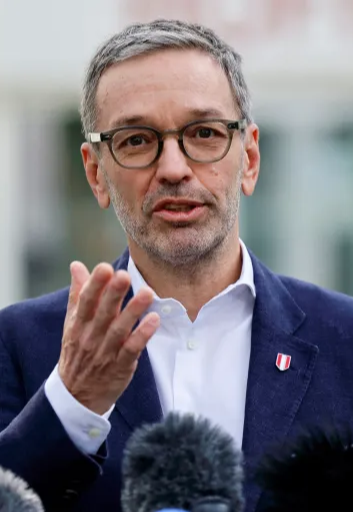
Vienna, September 29 (RHC)--- Austria’s Freedom Party (FPO) is projected to finish first in the country’s general election, ahead of the governing conservatives, underlining rising backing for hard-right parties in Europe prompted by concern over immigration levels.
An exit poll by pollster Foresight for broadcaster ORF projected on Sunday that Herbert Kickl’s FPO had received 29.1 percent of the vote, with Chancellor Karl Nehammer’s Austrian People’s Party (OVP) coming second with 26.2 percent.
The centre-left Social Democrats (SDP) were projected to come third, with 20.4 percent.
A separate projection by pollster Arge Wahlen also had the FPO coming first, winning by about four percentage points, a bigger winning margin than final polling had indicated.
The projections were met with cheers by jubilant party staff and supporters at an FPO event in the capital, Vienna.
Kickl, a former interior minister who has led the FPO since 2021, seeks to become Austria’s new chancellor on the back of the first far-right national election win in the country since World War II. However, the 55-year-old would need a coalition partner to command a majority in the lower house of parliament – and rivals have said they will not work with him.
The FPO is willing to hold talks with all parties on forming a government, Kickl told national broadcaster ORF after the projections were released.
Speaking alongside other party leaders, Kickl said other parties should review their refusal to form a coalition with him. The OVP, which like the FPO backs tougher immigration rules and tax cuts, is the only party open to forming a coalition with the far-right party – but without Kickl.
In his first remarks after the polls, Nehammer said he stood by his refusal to form a government that includes the FPO head. Concerns over the economy and immigration into the country dominated the campaign period nearer the polls and largely dissipated the votes of the OVP.
An FPO victory would make Austria the latest European Union country to register surging far-right support after gains in countries including the Netherlands, France and Germany.
The Eurosceptic party – which is critical of Islam, has close ties with Russia and pledges tougher rules on asylum seekers – won a national vote for the first time in June when it beat the OVP by less than a percentage point in European elections.
President Alexander Van der Bellen, who oversees the formation of governments, has voiced reservations about the FPO because of its criticism of the EU and its failure to condemn Russia’s invasion of Ukraine. The party opposes EU sanctions on Moscow, citing Austria’s neutrality.
The president has hinted he might thwart Kickl, saying the constitution does not require him to ask the first-placed party to form a government, even though that has long been the convention.

